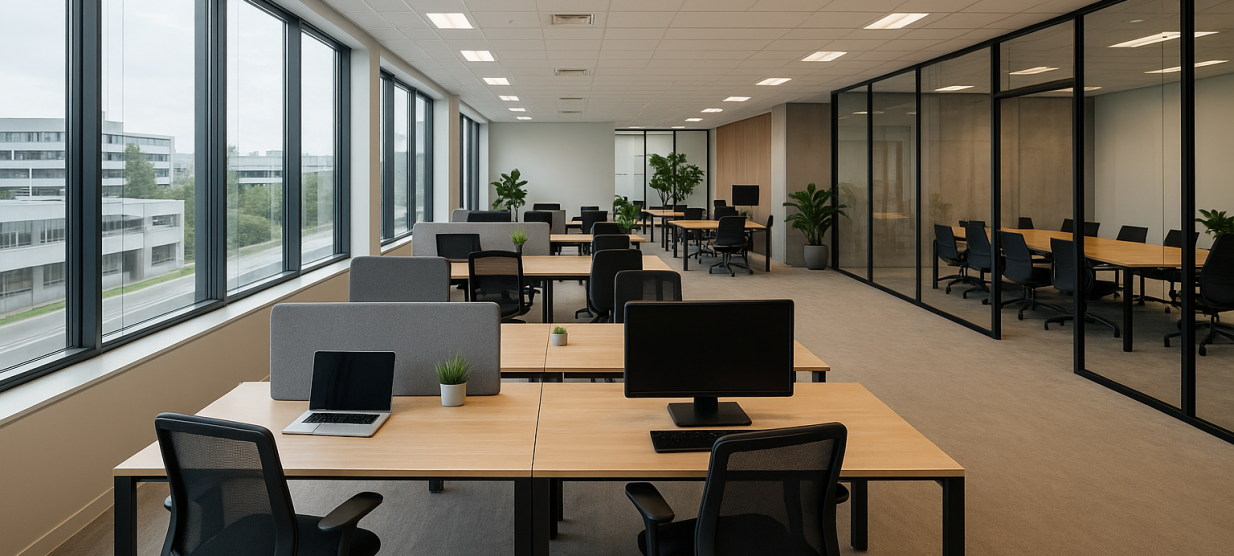The Future of Workplace Flexibility in Serviced Offices
In an era where agility isn’t just a buzzword but a business imperative, the landscape of office space is undergoing a seismic shift. The traditional 9-to-5 cubicle farm is giving way to a more fluid, adaptable model. One where serviced offices stand at the forefront of this revolution. For small businesses and dynamic companies alike, the future of workplace flexibility isn’t just about convenience; it’s about survival, growth, and staying ahead of the curve.
Rethinking the Office: From Static Space to Dynamic Ecosystem
Gone are the days when a fixed office was the only way to establish a professional presence. Today’s office environment is a living, breathing ecosystem. Designed to evolve with the needs of its occupants. Serviced offices exemplify this trend perfectly. They offer a flexible, all-inclusive solution that allows companies to scale up or down without the hassle of long-term leases or costly renovations. This flexibility is a game-changer, especially for startups and small businesses navigating unpredictable markets. Instead of committing to a rigid space, they can pivot swiftly, expanding or contracting their footprint as required.
The future of workplace flexibility hinges on this adaptability. Serviced office providers are investing heavily in creating spaces that are not just functional but also inspiring. Modular layouts, hot-desking options, and shared amenities foster a sense of community and innovation. For small businesses, this means access to premium facilities without the hefty price tag or administrative burden. It’s a win-win, offering a professional environment that can morph to fit evolving business strategies.
Technology as the Catalyst for Flexibility
At the heart of this transformation lies technology. The future of office and serviced office spaces is intrinsically linked to digital innovation. Cloud-based platforms, smart booking systems, and seamless connectivity enable businesses to manage their workspace needs effortlessly. For small companies, this means no more cumbersome paperwork or lengthy negotiations, just instant access to a workspace that adapts to their schedule.
Moreover, technology enhances the flexibility of the physical space itself. IoT devices and smart office solutions optimize energy use, improve security, and streamline day-to-day operations. This not only reduces overhead costs but also creates a more sustainable, eco-friendly environment. As remote work continues to gain traction, the smart integration of technology in serviced offices will be crucial in maintaining a balance between physical presence and virtual collaboration.
The Rise of Hybrid Work Models
The future of workplace flexibility is deeply intertwined with the rise of hybrid work models. No longer is it sufficient to offer a single, static office space; instead, companies are seeking a blend of remote and on-site work that maximizes productivity and employee satisfaction. Serviced offices are uniquely positioned to support this shift, offering flexible memberships, on-demand spaces, and collaborative zones that cater to diverse working styles.
For small businesses, this hybrid approach reduces the need for large, permanent footprints while still providing a professional environment for meetings, team-building, and client interactions. It also empowers employees to choose where they work best, fostering autonomy and engagement. The serviced office of the future will be a hub, a flexible, vibrant space that complements remote work rather than replacing it.
Sustainability and Well-being: The New Workplace Priorities
As the world becomes more conscious of environmental and social responsibility, the future of workplace flexibility must also prioritize sustainability and well-being. Serviced offices are stepping up by integrating green building practices, promoting wellness initiatives, and creating spaces that enhance mental health. Natural light, biophilic design, and ergonomic furniture are becoming standard features, transforming the office from a mere work zone into a sanctuary for productivity and health.
For small businesses, these features are more than just perks, they’re strategic advantages. A healthy, happy workforce is more innovative, engaged, and loyal. As companies seek to attract top talent and foster a positive culture, the flexible office of tomorrow will be a space that nurtures both business growth and employee well-being.
Looking Ahead: The Future is Flexible
The future of workplace flexibility in serviced offices is vibrant, dynamic, and full of promise. It’s a future where office space is no longer a static asset but a flexible, responsive environment that adapts to the ever-changing needs of businesses. For small companies and forward-thinking enterprises, this shift offers an unprecedented opportunity to innovate, grow, and thrive in a competitive landscape.
As we move forward, expect to see a continued blurring of boundaries between physical and virtual workspaces, driven by technological advancements and a deeper understanding of what makes a productive, healthy work environment. The office of the future isn’t just a place to work, it’s a customizable ecosystem that empowers businesses to succeed on their own terms. And in this brave new world, flexibility isn’t just a feature; it’s the foundation of tomorrow’s workplace.

Do not hesitate to contact us
Get in touch, if you have any question
